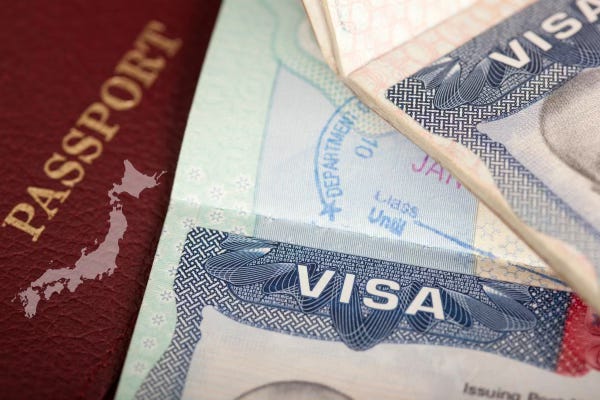When Regulations are So Stupid...
that it's the people in charge of enforcing them who explain how to get around them
Note : This article is the 2nd in a series on over-legislating a a path that more and more nation-states are taking in an attempt to emasculate the disruptions that threaten them.
Here is the first article in the series :
Today, we're going to have a little fun with a few true stories about regulations that are so stupid...
that it's the people in charge of enforcing them who explain how to get around them.
Oh yes, it happens. Let me tell you a friend's (again, true) story to convince you.
Karine wants to go to Japan. For many people, this poses no particular administrative problem, but Karine, although a resident of a European Union country, is not a citizen: with her passport, she has to apply for a visa.
So she goes to the Japanese consulate, and learns that to obtain her visa, she must not only present the plane tickets already purchased, but also proof of hotel reservations for the entire duration of her stay.
The problem is that Karine is a nomad, and 1) she knows roughly when she'll be in Japan, but she doesn't know the exact dates, or even which country she'll be coming from, and 2) she has no idea what itinerary she'll adopt when she gets there: that's how she travels, on an adventure.
She confides in the consulate employee, who told her in confidence: "You know, all you have to do is take fully refundable tickets and a hotel: as soon as you get the visa, you ask for the refund, they never check."
Karine followed these instructions to the letter, and everything went like clockwork: once she had obtained her visa, she cancelled all her bookings free of charge, and crossed the Japanese border like a letter in the post.
Let's meditate for a moment on a regulation that imposes such ridiculous constraints that the person responsible for implementing them explains how to get around them, out of a sense of humanity.
We can imagine how such regulation was created:
[The setting is a neon-lit meeting room with beige walls. A dozen people dressed in gray suits are seated around a rectangular table].
Head of department, moderating the meeting: Well, we've received a request from the boss himself at the Ministry: we absolutely must do something to reduce the number of illegal immigrants in our country! Any proposals?
Rest of team: [sullen silence]
Department manager: Nobody? No ideas?
Service employee no. 1: Well, if we look at the stats, we see that most illegal immigrants are people who have entered legally, but have overstayed their authorized stay1 . So we could impose stricter conditions for visas?
Employee no. 2: At the same time, we mustn't make legal immigration too difficult either - our companies need skilled labor.
Employee 1: Well, we could add conditions to tourist visas.
Employee no. 2: Yes, but most tourists come without a visa.
Employee no. 1: Well yes, but at least it would provide a solution for tourists who need a visa.
Employee 2: And what restrictions do you propose?
Employee 1: I don't know, we'll have to think about it.
Employee no. 3: What if we asked them to buy their plane tickets and book their hotels in advance? They'll have to do it at some point anyway.
Employee 2: What's it for?
Employee no. 3: Well, that way, it filters out people who come and can't afford to stay or leave. These are people who might be tempted to stay and find illegal jobs. What's more, if they're asked for a tourist visa, it's because they come from a poor country that we're suspicious of, so we have to be wary.
Employee no. 2: But if their visa is refused, they'll already have paid for everything.
Employee no. 3: Well, all they have to do is buy refundable tickets and hotels. After all, we're not responsible for everything.
Employee 2: Yes, you're right.
Employee no. 4: But wait, what's to stop people from taking refundable reservations and requesting a refund after the visa has been validated?
Department manager (thinking he's finally got an idea to give his boss so he'll leave him alone): Well, there are always people who cheat, but it's not our job. It's the job of [an alternative yet competing service that the present service doesn't like very much] to check that people respect their visas after they've been granted. That's a good idea, good job, employee #3! I'll send it to the Ministry, they'll be happy with us.
[Everyone nods and looks relieved to have completed the task in hand].
Trainee (in a corner of the room, just as everyone is about to leave, in a small voice, after a moment's hesitation): If you don't mind, gentlemen, dear colleagues, I have a neighbor whose cousin sometimes travels "adventurously", without choosing her itinerary in advance... For people like that, it's going to be a pain in the ass, isn't it?
[The few people who heard the trainee look at him half skeptically, half bored, and say to themselves for about half a second, "Some people really are weird sometimes," as they leave the room].
Flash-forward years later: the procedure is in place and nobody has thought to check whether it's really useful or not, apart from a trainee who wrote a note several years after it was put in place, which nobody has read. Many consulate employees of this country recommend that people who are blocked by this request get around it by using the hack that had already been identified in the initial meeting.
Of course, this meeting scene is entirely fictitious. But the regulation itself is not: at some point, someone, or more likely a group of a few, thought it was a good idea to set it up, even though 1) it can be easily circumvented, especially by people who want to immigrate illegally, and 2) it serves no purpose other than to annoy honest people who have better things to do.
The fact that it's still in place shows that there isn't enough measurement of its effectiveness after the fact, and the fact that consulate employees themselves explain how to get around it attests to the fact that people on the ground are aware of the rule's uselessness, and that those who created it have a problem connecting to reality2 .
The truth is, we've all stumbled across a stupid regulation at one time or another, and been saved from monumental time-wasting and frustration by a helpful person who helped us get around it.
Let those who have never been happy that a regulation didn't apply to them cast the first stone.
Another travel example: round-trip tickets
Many countries require tourists, even those who don't need a visa, to show proof of a return ticket, or at least an exit ticket, when entering their territory, and not just an outward ticket.
The aim is obviously to prevent those who want to immigrate illegally from taking advantage of a tourist trip to achieve their goal.
A simple and effective idea, isn't it?
If you laughed, we understood each other. For :
What's to stop someone who wants to immigrate illegally from buying a refundable exit ticket, then requesting a refund after crossing the border?
Many round-trip tickets are cheaper than one-way tickets. So what exactly is the objective of the people who set up this regulation? If it's cheaper, or just a little more expensive, to buy a round-trip ticket than a one-way ticket, what's to stop our wannabe illegal immigrant from simply using his one-way ticket, and not the return?
It's so ridiculous, in fact, that there are now online services offering to buy you tickets for a few dollars3 : the company buys a refundable ticket for you, allowing you to board the plane, then takes care of requesting the refund a few days later. These services have been created in particular for travelers and digital nomads who, like me, like to travel without really knowing where their steps are going to take them, and therefore haven't planned their itinerary to the day.
Note that this type of ticket, even if it's in your name, may not be considered "real": I therefore recommend that you only use them to board the plane, and if a customs officer asks if you have an exit ticket, tell him or her "not yet4 ". Rule of thumb: never lie to a customs officer! In fourteen years of travel, at a rate of six months' travel per year, I've never seen a customs officer ask this question: the only ones who can ask it are the airlines, who expose themselves to heavy fines if they take on board passengers who are refused entry to a country (yet another function that the government should be carrying out, and which it cheerfully delegates to private companies, by coercion, threatening them with fines if they don't do the job properly. That companies can't resist this form of slavery is beyond me).
So here we see another magnificent example of widespread regulation that serves absolutely no purpose, apart from annoying honest people who, with a little intelligence, can learn to get around it, while representing a completely insignificant obstacle for illegal immigrants.
Another example: opening a bank account
Let's not stop there. A friend of mine, whom we'll call Thomas, wanted to open a bank account for one of his businesses.
He took all the necessary steps online, then went to the bank's office to finalize the file.
As he waits in the designated room, his phone rings:
"Hello, this is Mrs. XXX, your consultant. Someone from the security department will call you. As soon as you've answered her questions, we can meet to finalize the account opening. I'll also be on the line to listen to your call."
Well, it wasn't meant to be, but so be it. A few minutes later, Thomas receives a phone call from the person in charge of the verification. The first thing he asks is the name of his company. Thomas answers, but the auditor is not satisfied: something is missing.
Thomas doesn't understand, and gives the name of his company again. The auditor then asks Thomas to read carefully the official document showing the name of his company.
Thomas, beginning to show signs of impatience, complies. He then realizes what the auditor is asking: that he give the name of his company, with the legal form at the end. So he complies, while beginning to get seriously annoyed by this obviously stupid procedure: "The name of my company is Name of my company LLC."
"That's it!" exclaims the auditor, very happy to have been able to contribute to the advancement of humanity by being picky about this subject.
He then asks Thomas to tell him his company's estimated annual sales. Thomas complies. The auditor is annoyed: it's not exactly the figure he gave when he filled in the online application.
The problem was that Thomas had filled out the application several weeks earlier, and the file had been held up because Thomas had missed a request for documents issued by the bank (he had inadvertently uploaded an old electricity bill).
So Thomas says: "I don't remember what I put in, but it was an estimate. My estimate today is such and such a number."
Auditor: "Give me 10 minutes, sir, I need to validate this with my supervisor."
Thomas, who has already waited far too long and is used to being able to open accounts online without any problems, replies, ulcerated: "No, I'm not going to wait any longer. I like unbureaucratic banks, and yours is too bureaucratic. I no longer wish to do business with you, good-bye." He hangs up.
His consultant (who was eavesdropping on the conversation) calls him back immediately, and offers to see him right away.
Thomas, still annoyed, but nonetheless a little happy that a human being is finally offering him a humane solution, accepts, grumbling.
The advisor then said, "These are the procedures from now on. This security guy checks to make sure you're answering the way it's supposed to be in your file, otherwise he'll refuse the account. We have problems with this all the time, especially when it's accountants or consultants filling out the online form for their client. So what I'm going to do is show you the answers on your form, which I've printed out. We're going to call the person back and you're going to say exactly what it says on the record, okay?"
Thomas thanks the consultant for her humanity, takes the file, and each time the auditor asks a question, reads the answer indicated.
The call was a success! The account is approved. Thomas can't help but applaud this magnificent security procedure, which obviously manages to prevent criminals from opening accounts, without ever bothering honest people.
I'll now leave you to imagine the meeting during which this fabulous procedure was invented: go ahead, it's an exercise that will serve you well in the future, as you'll be able to do it again when you fall victim to another stupid procedure, to gain a little perspective on your situation :)
And of course, this magnificent procedure is just one of many examples of the stupid, grotesque and Kafkaesque ramifications that KYC and AML have in the everyday lives of billions of human beings, as we saw earlier.
Coming soon
In the next article, we'll be looking at the European Union, which has a reputation for being one of the worst places in the world for regulation.
Is this true? And if it is, is it really slowing down its economy and innovation, as some claim? That's what we'll be looking at.
Stay tuned ! In the meantime, feel free to follow Disruptive Horizons on Twitter and on Linkedin, and join the tribe of Intelligent Rebels by subscribing to the newsletter :
And here is the first article of this series :
Which is true. Yoshida Chisato, Illegal Immigration and Economic Welfare, 2000
If you ever find yourself blocked and frustrated because of a stupid regulation like this one, you can imagine how the meeting that gave birth to it went, it always helps to relax a little ;)
As Best Onward Ticket
In the worst-case scenario, you can buy a cheap exit ticket at the border if a customs officer asks you to - I've never experienced or heard of any such case.








